Following a fourteen-year absence from the company’s repertoire, the Atlanta Opera revisits Mozart’s Die Zauberflöte through a revival of its co-production with Indiana University Jacobs School of Music, originally unveiled in 2010. For those keeping count, that was Tomer Zvulun second production for the Atlanta Opera, fresh from a successful debut the previous year in Wagner’s Der Fliegende Hollander and still three years shy of his ascend to his current post as the company’s General and Artistic Director. In that occasion the opera’s musical numbers were performed in the original German with English spoken dialogue, and the cast back then was juicy, featuring important Atlanta Opera debuts such as Nicole Cabell as Pamina, Sean Panikkar as Tamino, and Kathleen Kim as the Queen of the Night. To be fair, the cards were stalked in favor of this production, as Atlanta Opera patrons only had the company’s 2003 full English language production of the opera for direct comparison, a production which perplexed many by its Indiana Jones conceptualization and was single-handedly saved by the Atlanta Opera debut of soprano Kelly Kaduce as a radiant Pamina. The revival kicked off the theme for the Atlanta Opera’s 2024-25 mainstage season, “a hero’s journey,” Mozart’s Die Zauberflöte filled the auditorium of the Cobb Energy Center for the Performing Arts this past Saturday, offering patrons a needed break before election night through Mozart’s delightful work. In terms of musical merit of its cast and overall reception, this production betters the company’s previous presentations of Mozart’s masterpiece.
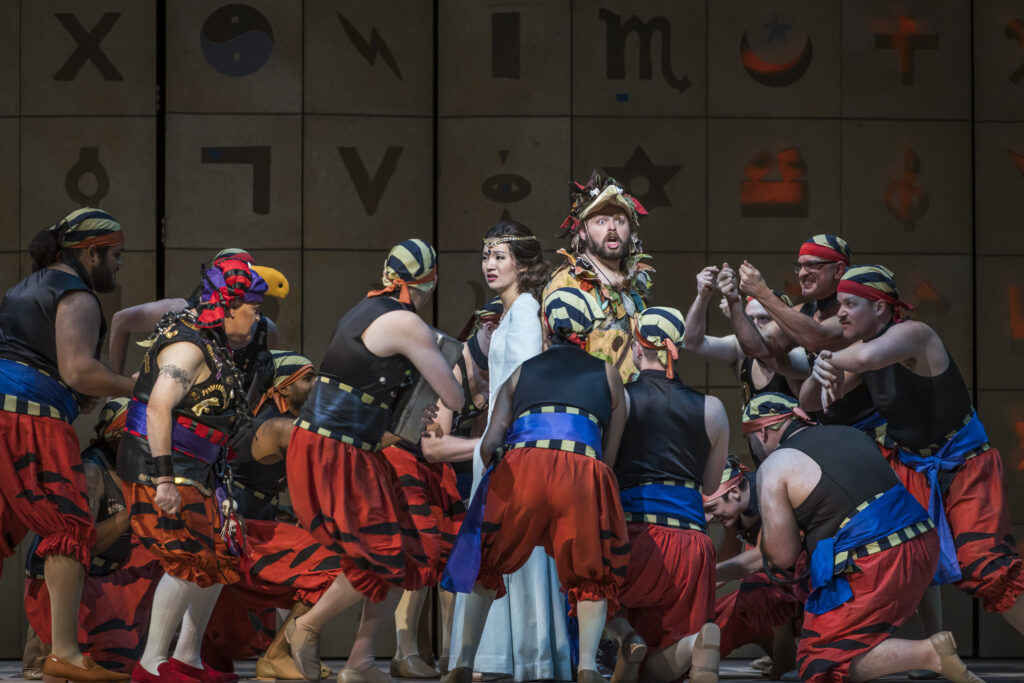
For this revival, a stand-in for Mozart himself makes an appearance at the rise and fall of the curtain, serving as the evening’s host rather than a guide to some of the libretto’s most blatantly problematic elements (which have been appropriate adjusted in the translated supertitles). Director Zvulun again leans heavily into the work of Scenic and Set Designer C. David Higgins, whose Egyptian themed backdrops replete with Masonic imagery – aided by the participation of puppeteers – do wonders to showcase the opera’s childlike appeal and facilitate the fairy tale to run its course. As a showcase of a hero’s arch, Director Zvulun offers an appropriately gallant and stoic study of Tamino, setting up contrast with Verdi’s Macbeth and Wagner’s Siegfried later in the season. Also returning to this production, Maestro Arthur Fagen maintained a consistent interpretation of the score. Though his current tempi are zippier, he remains graciously sympathetic to his soloists, while refraining from belaboring the point during extended orchestral passages.
Returning to the Atlanta Opera following her triumphant debut as Zerlina in Mozart’s Don Giovanni in 2023, soprano Mei Gui Zhang adds her name to the company’s growing list of excellent Paminas. Including the fresh and youthful memento of the above-mentioned Kelly Kaduce in 2003, Ms. Zhang does not suffer from direct comparison to her previous reference, Nicole Cabell, with whom she shares some vocal affinities. Her soprano is convincing within the plain context of its lyric splendor, meaning that in its basic, unforced nature, it charmed the audience as a feast of sound. Pamina’s music may not demand the sort of jaw dropping stunts that will go viral on Tik Tok (depending on the whims of the algorithm,) but the part demands subtle heavy lifting galore. The phrases that make up the magical heart of the opera, such as Pamina’s address to Sarastro in the first act finale, or her soliloquy to Tamino when she joins him to face the trials, are arguably sung by her. Pamina also requires musical sophistication and a considerable vocal arsenal to come to life. For instance, the simple lines of Pamina’s retorts to Papageno in the duet “Bei Mannern” must be carefully shaped to maintain the classic appeal of this deceptively simple ensemble.
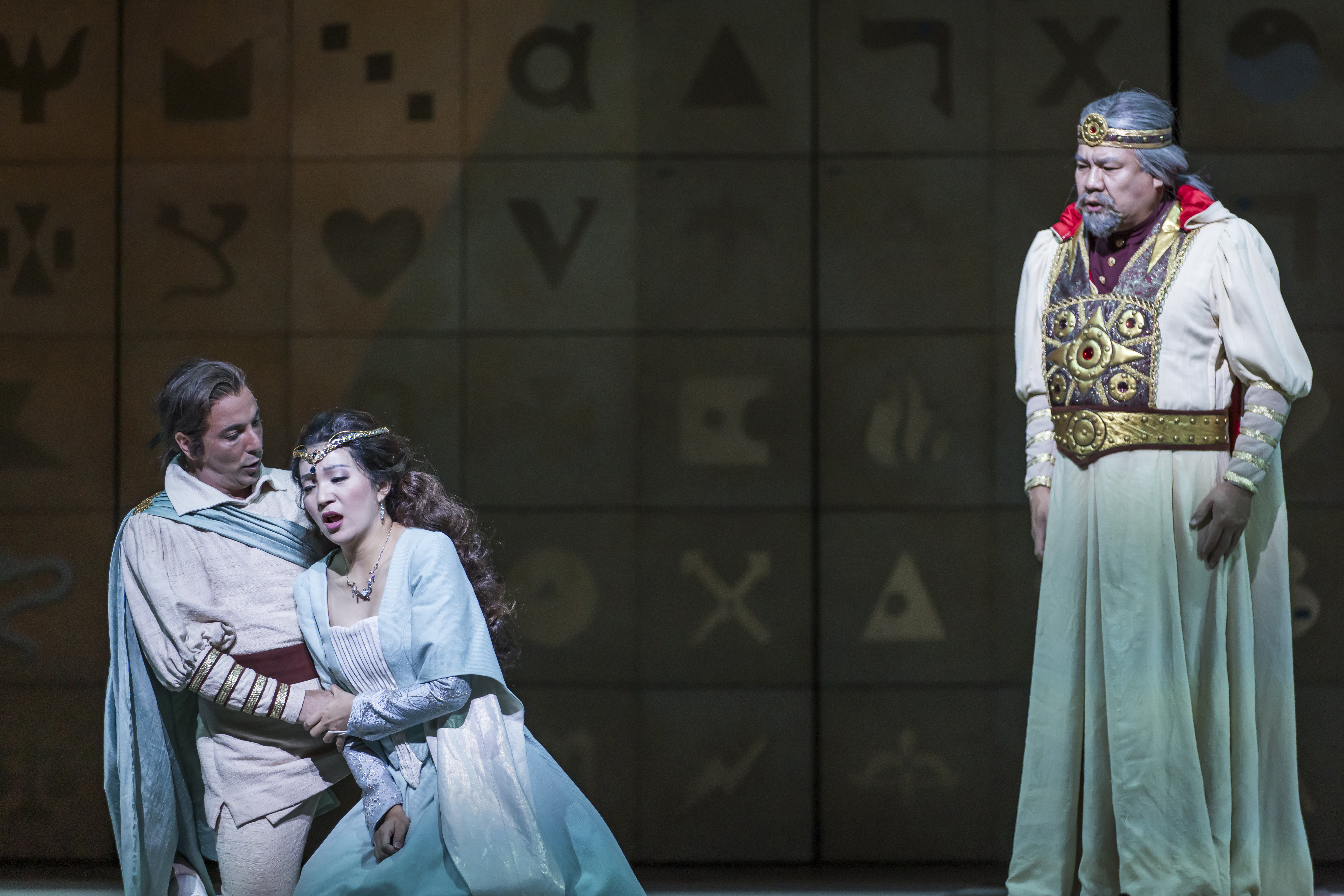
An ideal interpreter should also maintain a natural, unforced brand of beauty through the dynamics while remaining poised and commanding, often against noisy ensembles. Ms. Zhang proved capable of expanding her resources to achieve a greater sonority without significant loss of quality (though it must be said that, infrequently, a certain harshness and shortness at top would threaten her efforts). While not required to navigate the sort of gymnastics reserved for “mommie dearest,” Paminas must still address Mozart’s tricky florid writing (he sneaks plenty in the score) without losing grasp of the endless legato which makes her famous aria “Ach, ich fühl’s, es ist verschwunden!” a serious concern. As heard last Saturday, Ms. Zhang’s Pamina exhibited these qualities in spades, and through singing full of sincerity and grace achieved a certain elegance that is hard to feign. That Ms. Zhang achieved this while looking every inch the fairy tale princess catapulted the success of this performance of Mozart’s Die Zauberflöte beyond reasonable expectations. It was almost disrespectful.
Another returning artist, tenor Santiago Ballerini, revisits our city in a role that marks a departure from the Italian parts which have made him a favorite among Atlanta Opera patrons. Many will remember his fairy tale professional debut as a principal artist in 2017, when he stepped in for tenor Ji-Min Park as Ernesto in the company’s production of Donizetti’s Don Pasquale, and enraptured the audience with a sound recalling a bygone era. Subsequent assignments have sobered that original excitement, with both Tonio in Donizetti’s La Fille du Regiment and Ramiro in Rossini’s La Cenerentola raising concerns about the compatibility of his delicate tenore di grazia against some of the noisier scores in the bel canto repertoire. His assumption as Mozart’s Tamino, one of the most rewarding roles that Mozart wrote for tenor and a part requiring a decidedly different style of phrasing and discipline, proved an inspired choice on the part of this very special artist.
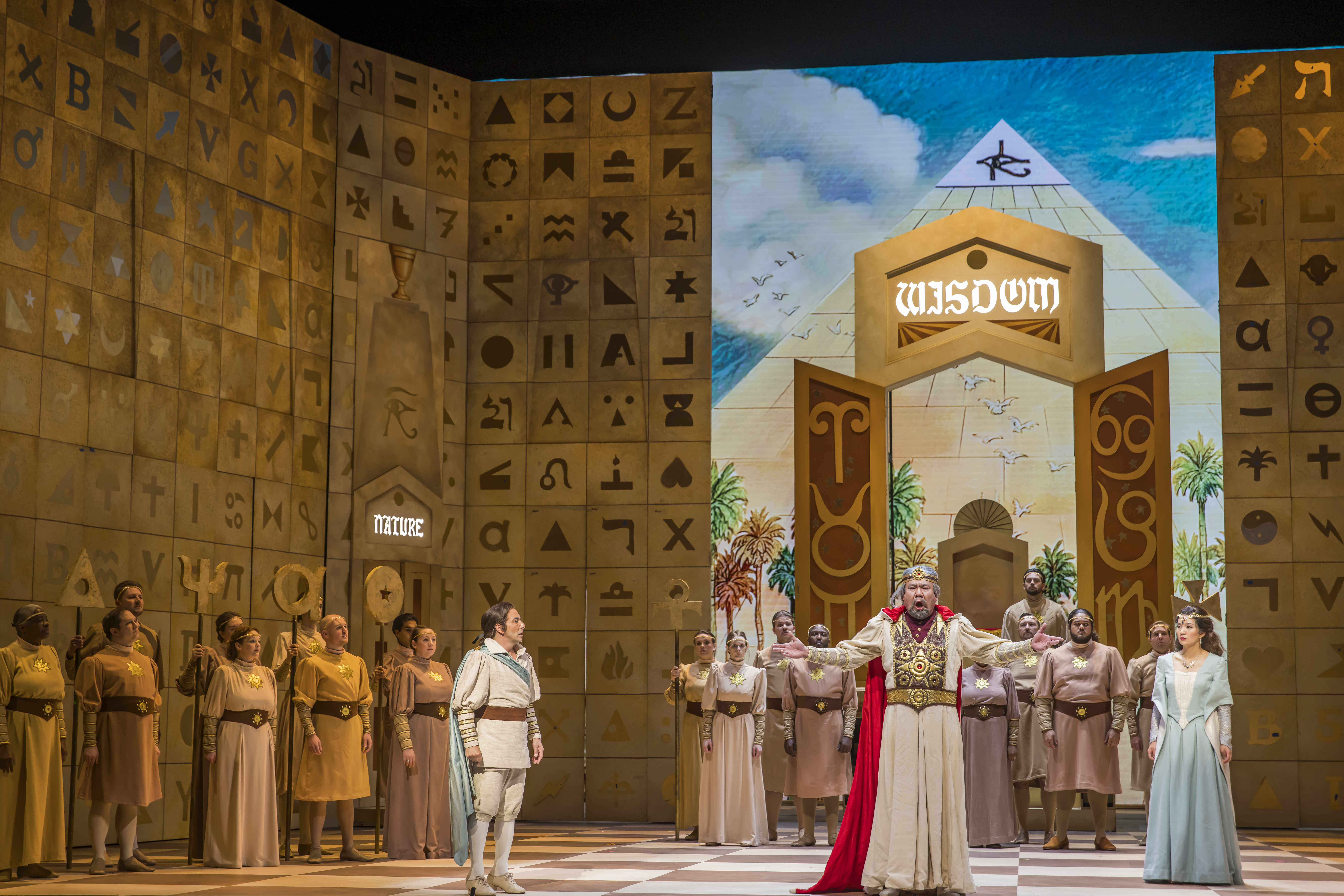
As heard in previous seasons, his singing remains seductive rather than imposing, and it serves this music well. As his tenor floated the long, wistful lines of Tamino’s “Dies Bildnis ist bezaubern schön”, his gallant instrument attracted attention by its unique romantic, pale timbre, which seduced listeners into not just leaning forward, but also shush those around them. In return, Mozart’s orchestra and ensemble proved flattering to his art, allowing Mr. Ballerini to deliver a vibrant reading of the role without fear of being sonically overwhelmed, or worse, temptation to over-extend his resources – this is simply not that sort of instrument. While it must be said that the few instances of incisive singing proved less convincing (his climax in the Act I finale “Vielleicht sah er Paminen schon!” required more heroism), this is not a great focus in Mozart’s aesthetic. Consideration of Ferrando is Mozart’s Cosi Fan Tutte would make for an inspired follow-up.
Vying for the allegiance of the young lovers is a pair of monolithic titans, each representing the polar extremes of this mythical landscape – both vocally and dramatically. At one end of the spectrum sits the Queen of the Night, whose role is comprised of two terrifying arias (one universally iconic) and little else. As the presence of a queen capable of conquering the elusive high F will bring out the masses, the assignment brings along with it a special brand of anxiety for those who specialize in it, and many fine exponents have fallen prey to its exacting demands. Until this revival, the Atlanta Opera had fallen short of landing a great one, with Jeanine Thames’s 2003 assumption leaving little impression, and Kathleen Kim, while managing her arias admirably, failed to command the stage in 2010. The Atlanta Opera’s current queen, soprano Rainelle Krause making her company debut in her signature role, changed the trend by capitalizing on every available opportunity to improve upon the efforts of her Atlanta predecessors. She earned the night’s loudest ovations, and deservedly so.
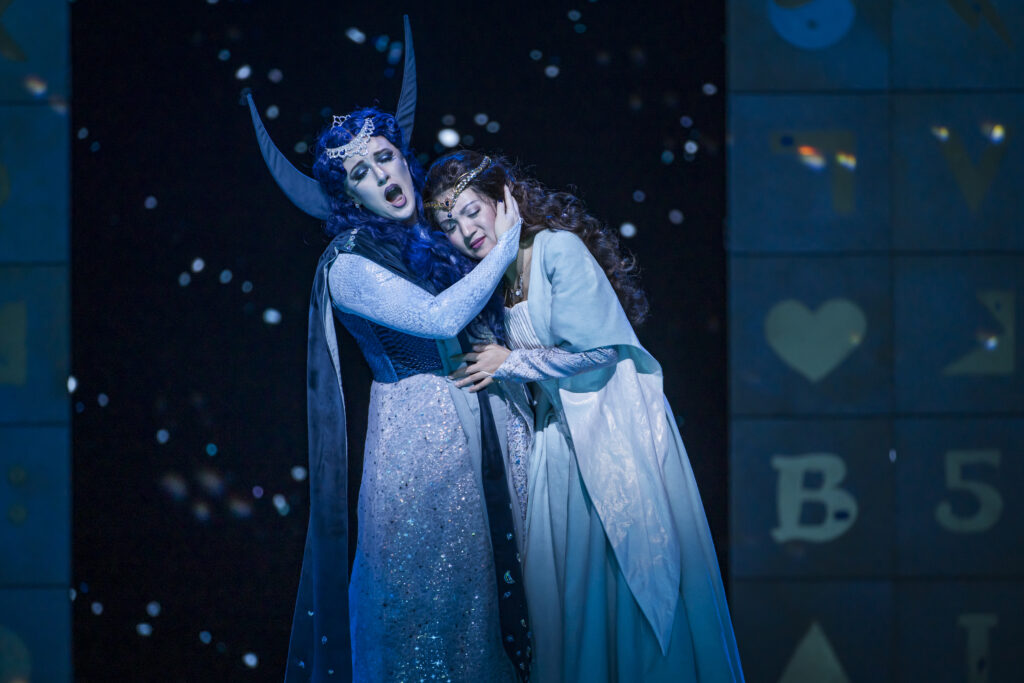
Tackling the role’s first hurdle “O Zittre Nicht,” Ms. Krause proved proficient in the declamatory style needed to convince in the aria’s dramatic narrative, all the while displaying the technical mastery to conquer the pyrotechnics of the brilliant allegro which closes it. For Act II’s aria “Der Holle Rache” (y’all know the one,) Ms. Krause immersed herself into her character with exciting abandon, unafraid to rattle her tone to match the fury of the character. As heard on the opening night performance, her voice is an incisive, crystalline lyric soprano, which acquires a chilling glassy sheen as it ascends up the scale to the extreme top. Her admirable passagework included the often ignored grupetti leading into the famous sequence of staccati, which Ms. Krause accomplished with precision, though it must be mentioned that the famous high F’s were somewhat pinched and betrayed a slight flatness. Her entrances were both stoic and thoroughly convincing, though a simple youtube search shows that Ms. Krause is more than capable of delivering this music even under duress. Director Zvulun could have entrusted her with more varied stage business, particularly during her famous Act II number.
Her nemesis Sarastro was played by bass Peixin Chen, also making his Atlanta Opera debut, who was double cast as both Sarastro and the Speaker in these performances. This double duty allowed Mr. Chen a brief warm up as preparation for the rigorous display demanded by Sarastro at the end of Act I, and it paid off. He delivered his address to Pamina with imposing, large tones which did not lose color or character as they descended towards the cavernous basement of the bass range into the low G and low C territory. Even in the dialogue and subsequent aria at the opening of Act II, “O Isis und Osiris,” his sound projected forth with Darth Vader confidence, revealing his position not only as the dramatic, but also the vocal foe of the Queen of the Night. Like the queen, Sarastro’s role is primarily composed of a brief ensemble and two imposing arias, the second of which (In diesen heil’gen Hallen) is quite famous. Delivered by Mr. Chen’s rich and firm voice, it regained its rightful competitive status alongside the queen’s recent outburst. Previous Atlanta Opera Sarastros have grown dim and froggy in these important moments, and for this alone Mr. Chen’s performance is already an improvement upon their efforts.
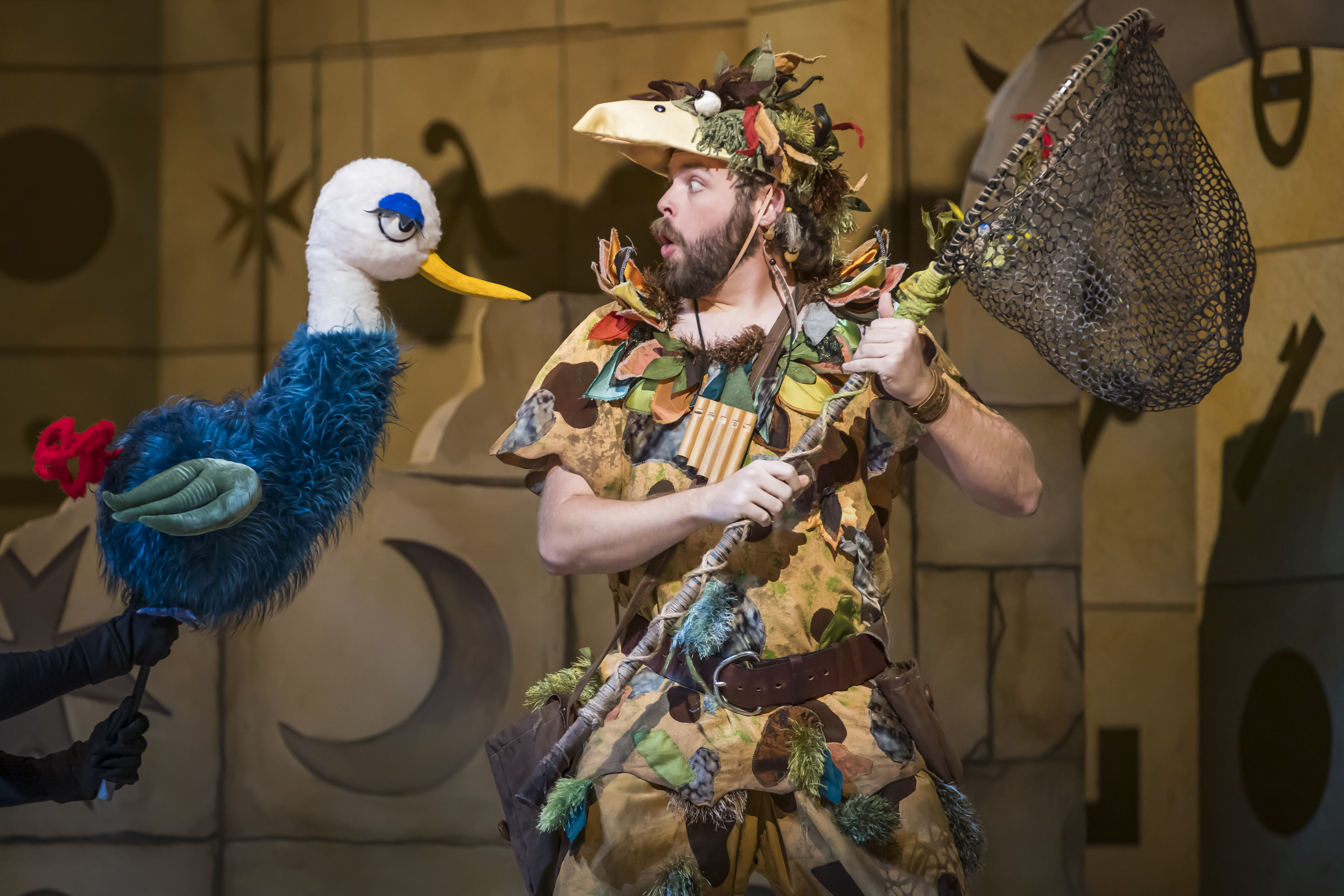
Fresh from his recent success as Marcello in the Atlanta Opera’s production of Puccini’s La Boheme at Pullman Yards, baritone Luke Sutliff managed to strike the right tone in his impersonation of Papageno. The role was written for Mozart’s friend and Impresario of the Theater auf der Wieden, Emanuel Schikaneder, who also wrote the opera’s libretto, and was a gifted theatrical jack of all trades. The role is modelled after the comic Hanswurst German tradition, and the orchestral guide at the start of his arias (presumably to assist the singer in matching the pitch) as well as the overall technical demands in the music, implies that a great singer is not a vital requirement for the part. Yet unlike his leading royal partner, the role of Papageno (though framed under the guise of comic relief) is surprisingly more congruent with the season’s theme, “A hero’s journey”. Papageno represents the common man, at first concerned with his basic motivations, but gradually one that questions authority and, within the bounds of buffoonery, is willing to die for love. The role presents greater opportunities for character development, which Mr. Sutliff was keen to exploit to project a lovable, relatable figure for which the audience happily rooted for. His newfound girlfriend, soprano Amanda Sheriff, shared his spotlight in her brief appearances and more than matched Mr. Sutliff’s antics without overpowering it. These kids are in it for the long haul.
Mozart’s Die Zauberflöte boasts a large cast, but even the smaller roles are given their due chance to shine. If Tamino is an unusually meaty role for tenor in Mozart’s canon, the comprimario role of Monostatos represents the standard. The role can be viewed as highly problematic depending on which translation of the libretto you choose to read, and thankfully our friends at the Atlanta Opera tweaked the supertitles to ensure that legendary tenor Barry Banks, luxuriously cast in the part, did not get cancelled. The three ladies who serve The Queen of the Night must all be great singers, and it is not rare to find artists entrusted with these roles graduate to important principal parts. Sopranos Diana Newman, Alexandra Razskazoff and mezzo-soprano Meridian Prall did fine by their assignment, and should be names to be referenced in the future. In turn, tenor Wayd Odle and bass Jason Zacher took on dual assignments, first as the disparate pair of priests strangely denied of their short duet “Bewahret euch vor Weibertücken”, later switching into the garb of the armored men who welcome Tamino to the initiation trials in with a firmly delivered “Der, welcher wandert diese Straße voll Beschwerden”. The casting of three spirits as children (Angel Williams, Adrienne Ocfemia and Max Walls) raised the eyebrow, since traditionally three sopranos of short statute are cast in larger theaters to ensure that their voices are heard without strain. I suspect that their performance may have – allegedly – benefitted from artificial assistance, producing an alien, startling effect when contrasted to the rest of the cast (compare the sound of a piano versus the sound of a harpsichord for a generalized aural picture of how that hit the auditorium).
There are two more performances of Mozart’s Die Zauberflöte, and Friday night’s show will be available via Livestream! For more information, please visit the company’s website at www.atlantaopera.org
-Daniel Vasquez